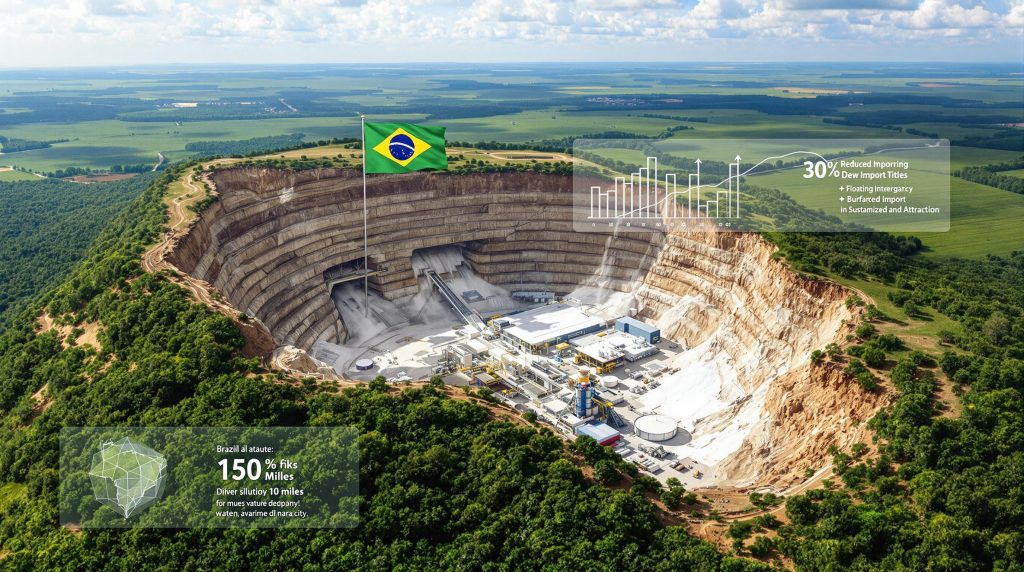Brazil Potash's Autazes Project: Securing Brazil's Agricultural Future
Brazil's position as a global agricultural powerhouse is set to strengthen with the development of Brazil Potash's Autazes Project, a groundbreaking initiative that promises to reshape the country's fertilizer supply chain. Located in the heart of the Amazon, this strategic mine aims to reduce Brazil's dependence on imported potash, a critical nutrient for crop production.
Project Overview and Strategic Importance
The Autazes Project represents a significant advancement in Brazil's quest for agricultural self-sufficiency. Situated approximately 100 miles from Manaus in Brazil's Amazonas state, this underground potash mine will produce 2.4 million short tons of potash annually once operational, supplying approximately 17% of Brazil's current potash requirements.
With a total construction cost estimated at $2.5 billion, the project is designed to address a critical vulnerability in Brazil's agricultural sector. Currently, Brazil imports nearly all of its potash fertilizer, creating substantial supply chain risks for a country whose economy relies heavily on agricultural exports.
As Brazil Potash's CEO Matt Simpson notes, "The project would be key for the country, a global agricultural powerhouse which imports almost all of its potash fertilizer." This dependency has exposed Brazilian farmers to price volatility, supply disruptions, and currency fluctuations – challenges that domestic production could significantly mitigate.
Funding Structure and Investment Strategy
Brazil Potash has successfully raised approximately $280 million for initial construction phases but is now seeking an additional $1.7-1.8 billion in debt financing to complete the project. This funding approach reflects the scale of the undertaking and the company's strategy to diversify financial risk.
"We're speaking to a number of different banks. We're also speaking to some export credit agencies and some international financial institutions," explained Simpson, highlighting the multi-faceted approach to securing the necessary capital.
The company is engaging with both domestic Brazilian financial institutions and international banks, exploring support from export credit agencies, and seeking partnerships with international financial institutions. This diversified funding approach aims to manage the project's scale and risk effectively.
Investment Insight: Large-scale resource projects in emerging markets often utilize blended financing structures, combining commercial debt, development finance, and strategic equity partners to mitigate country and project risks.
Commercial Viability Through Secured Sales Agreements
A key factor differentiating the Autazes Project from other mining ventures is its strong commercial foundation. Brazil Potash has already secured a major offtake agreement with Amaggi for 550,000 tons of annual production, representing nearly a quarter of planned capacity.
Additionally, the company has established a memorandum of understanding for an additional 1 million tons with another agricultural company and is in negotiations with a third potential client. As Simpson confirmed, "Over the course of the next couple of months, we're aiming to have about 2.2 million of our 2.4 million (short tons) under contracts for at least 10 years in duration."
These long-term agreements provide critical revenue stability and demonstrate market confidence in the project. The 10-year minimum duration of these contracts establishes a solid foundation for the project's financial projections and investment opportunities insights.
| Offtake Partner | Annual Volume (tons) | Contract Status | Duration |
|---|---|---|---|
| Amaggi | 550,000 | Secured | 10+ years |
| Unnamed Company | 1,000,000 | MOU Signed | 10+ years |
| Third Client | Under negotiation | In Discussion | 10+ years |
| Target Total | 2,200,000 | 91.7% of capacity | 10+ years |
Environmental Management and Sustainability Approach
The Autazes Project's location in the Amazon region necessitates comprehensive environmental management strategies. Brazil Potash is implementing advanced water recycling systems for production processes, with Simpson noting that "water used in potash production will largely be recycled."
The underground mining approach also offers environmental advantages compared to open-pit alternatives, minimizing surface disruption in this ecologically sensitive region. By utilizing specialized mining techniques, the project aims to reduce its ecological footprint while maximizing resource recovery.
The company's environmental protection measures include:
- Closed-loop water management systems to minimize freshwater consumption
- Underground mining techniques that preserve surface ecosystems
- Tailings management systems designed to prevent environmental contamination
- Energy efficiency initiatives to reduce carbon footprint
- Habitat preservation and biodiversity monitoring programs
Furthermore, the mine reclamation importance has been integrated into the project's planning phases, ensuring responsible end-of-life management.
Development Timeline and Production Roadmap
The Autazes Project is following a structured development timeline, with production targeted to commence around 2030. This extended timeline reflects the complexity of developing a major mining operation in the Amazon region and the comprehensive permitting process required for projects of this nature.
Key development milestones include:
- Completion of financing arrangements (current phase)
- Finalization of remaining offtake agreements
- Environmental permitting and regulatory approvals
- Detailed engineering and procurement
- Construction and commissioning
- Production ramp-up to full capacity
The phased development approach allows for efficient capital raising methods and risk management throughout the project lifecycle.
Impact on Brazil's Agricultural Sector
Brazil's agricultural sector stands to benefit significantly from domestic potash production. As one of the world's largest agricultural exporters, Brazil's farmers rely heavily on fertilizers to maintain soil fertility and crop yields across millions of hectares of farmland.
The current reliance on imported potash creates several challenges:
- Vulnerability to global supply disruptions
- Exposure to international price volatility
- Significant transportation costs
- Currency exchange risks
- Supply chain complexity and delays
Domestic production through the Autazes Project addresses these challenges by providing a stable, local source of this essential nutrient. This supply security could translate into more consistent fertilizer pricing, benefiting agricultural planning and potentially reducing input costs for Brazilian farmers.
Economic Benefits Beyond Agriculture
The economic implications of the Autazes Project extend well beyond the agricultural sector. For the Amazonas state, the project represents a significant economic development opportunity, creating jobs during both construction and operation phases.
The development of supporting infrastructure will benefit local communities, increasing economic activity in the Manaus region and providing opportunities for skills development and technology transfer. At the national level, reduced fertilizer imports will improve Brazil's trade balance, while tax revenue from mining operations will support government programs.
Regional Impact Perspective: Major resource projects in less-developed regions often create "economic corridors" that stimulate broader development through infrastructure improvements, increased local purchasing power, and the growth of support industries.
Global Market Positioning and Competitive Landscape
The scale of the Autazes Project places it among significant global potash developments, with its 2.4 million short tons of annual production representing a meaningful addition to global supply. However, its strategic significance lies primarily in its positioning within the Brazilian market.
The project's location provides a decisive advantage for serving Brazilian agricultural markets, with substantially reduced transportation costs compared to imported alternatives from traditional potash-producing regions such as Canada, Russia, and Belarus.
This competitive positioning could influence regional potash pricing dynamics and contribute to diversifying global potash supply sources, potentially helping to stabilize fertilizer supply chains in South America. The mining industry evolution is increasingly focused on regional supply security, particularly for critical agricultural inputs.
Implementation Risks and Market Considerations
While the Autazes Project offers significant potential benefits, several challenges could affect its success:
Implementation Risks:
- Securing the full financing package in current market conditions
- Managing construction in a logistically challenging Amazon location
- Meeting environmental requirements in a sensitive ecological region
- Potential timeline extensions affecting projected returns
Market Considerations:
- Global potash price fluctuations affecting project economics
- Competition from established international potash producers
- Evolving agricultural practices and fertilizer requirements
- Balancing production costs with market competitiveness
These challenges require careful management and contingency planning to ensure the project's successful implementation and long-term viability.
Technical Aspects of Potash Mining in the Amazon
The Autazes Project will utilize solution mining techniques, a specialized approach well-suited to the geological conditions of the Amazon basin. This method involves injecting a solvent (typically heated water) into the potash deposit, dissolving the minerals, and then pumping the solution to the surface for processing.
Key technical considerations include:
- Geological Factors: The potash deposits are located within sedimentary evaporite formations approximately 800-1,000 meters below the surface
- Mineral Quality: The potash reserves feature high-grade sylvinite with relatively low levels of impurities
- Water Management: Advanced water recycling systems will capture and reuse process water, minimizing environmental impact
- Processing Technology: State-of-the-art crystallization and flotation techniques will be employed to produce high-purity potassium chloride
- Logistics Infrastructure: Development of river transport systems to move finished product from the Amazon region to agricultural centers
The project also incorporates elements of mining sustainability transformation through its focus on efficient resource use and environmental protection, according to a recent Reuters report.
Frequently Asked Questions About Brazil Potash's Amazon Mine Project
What is the production capacity of Brazil Potash's Amazon mine?
The mine is designed to produce 2.4 million short tons of potash annually, which represents approximately 17% of Brazil's current potash requirements.
When is the mine expected to begin production?
Based on current development timelines, production is targeted to begin around 2030, following completion of construction and commissioning activities.
How much of the project's output has already been committed to buyers?
Brazil Potash has secured agreements for approximately 550,000 tons with Amaggi and has a memorandum of understanding for an additional 1 million tons with another company. Negotiations are underway with a third potential client, with the goal of securing contracts for 2.2 million of the 2.4 million short tons of planned annual production.
What environmental measures is Brazil Potash implementing?
The company is implementing several environmental protection measures, including water recycling systems for production processes and specialized mining techniques designed to minimize environmental impact in the Amazon region. The project has also faced scrutiny from environmental groups, as documented by AP News, due to its location in the sensitive Amazon ecosystem.
How much funding has Brazil Potash secured to date?
Brazil Potash has raised approximately $280 million for initial construction phases and is currently seeking an additional $1.7-1.8 billion in debt financing to complete the $2.5 billion project.
Disclaimer: This article contains forward-looking statements about Brazil Potash's Autazes Project, including projections about production timelines, financing, and market impacts. These statements involve risks and uncertainties, and actual results may differ materially from those projected. Readers should not make investment decisions based solely on this information.
Ready to Spot the Next Major Mineral Discovery?
Don't miss out on significant ASX mineral discoveries as they happen – gain instant alerts and actionable insights with Discovery Alert's proprietary Discovery IQ model, transforming complex announcements into clear investment opportunities. Explore how historic discoveries have generated substantial returns by visiting Discovery Alert's dedicated discoveries page and begin your 30-day free trial today.




